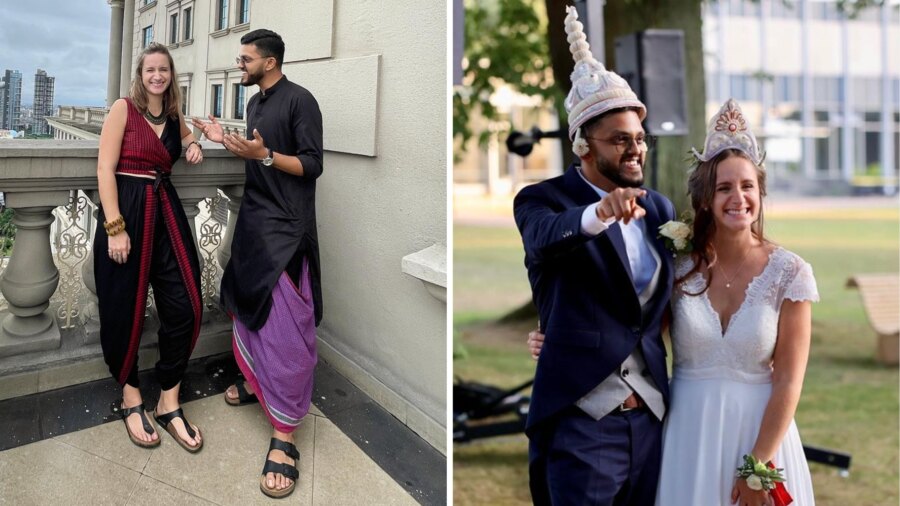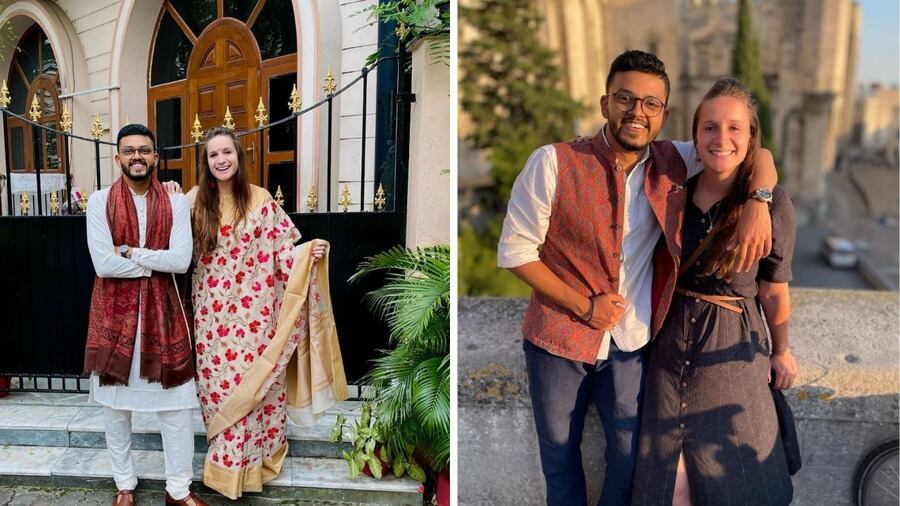The smiling face and warm persona of Meghdut Roy Chowdhury is all over social media. Be it his Indo-French Singing Sundays with his wife Pauline Laravoire, or his initiatives to put Kolkata on the map, Meghdut is a man on a (social) mission.
Along with being the chief innovation officer and executive director of Techno India Group, he is also the founder and chief curator of Offbeat CCU, and is part of a number of other initiatives. Pauline, on the other hand, is the sustainability director of Techno India Group and the founder of Y-East, a sustainability initiative.
On a weekday evening, My Kolkata caught up with Meghdut and Pauline at the Offbeat CCU rooftop — where one can witness “the best sunset in town” — to know more about their initiatives, future plans for the city, their dreamy wedding in France and more…
My Kolkata: With Make Calcutta Relevant Again (MCRA), you aim to put the east back on the map. Is this an initiative to strengthen entrepreneurship in Kolkata?
Meghdut: Make Calcutta Relevant Again is not just about strengthening entrepreneurship in the city, it’s about creating a positive narrative around the city. One of the major initiatives we have taken is around entrepreneurship. It has a lot of young people involved, and is called ‘Innovators Over Coffee’. It happens every last Friday of the month and is a push towards inculcating an entrepreneurial spirit, which I think is very important.
What are the initiatives and/or programs that you have in mind with MCRA?
Meghdut: The entrepreneurship initiative is the one that has come to the forefront, but there are a number of initiatives happening parallelly. If I had to put it in a line, I would say that MCRA’s goal is to create and recognise new idols for the city. Kolkata is steeped in nostalgia, which is great, but when it drags you down and deters growth, then nostalgia becomes an impediment to change. Maybe the community can coin a term for it. We’re trying to find out what the future of nostalgia could be and find people who are passionate about the city.
Pauline: (Laughing) Future-stagia!
Meghdut: Haha! Maybe! People who follow me on LinkedIn probably know that I get very possessive about the city every time I see baseless and negative posts on it. On top of that, I’m very protective of the narrative around Kolkata. With my city, I only hold positive debates and only on things that can propel the city forward. With MCRA, we’re bringing all the work we do in the spaces of entrepreneurship, innovation, sustainability, art, culture, music, theatre or street culture under one umbrella and letting people take the narrative forward. It’s not my campaign. It’s not anybody's campaign — nobody owns it. Anybody, anyone can co-opt it, make it their own.
In 2018, you started Offbeat CCU — one of India’s first interdisciplinary experiential learning centres. What were your thoughts behind creating it, and what are your plans going ahead?
Meghdut: The idea behind Offbeat was — how can we figure out where the future of education is headed? As an educationist, I have always believed that we need to preempt the future. It’s always been a problem in academia that ‘academia follows what industry leads’. I think that's the problem. We wanted to see what formats of education work, what education should be or could be. For me, education’s purpose is to open your eyes to the world. That’s why it was created. Everything that’s worked — we have kept; everything that hasn’t — you won’t see it here. We’ve always believed in a fail-fast-move-on-fast concept.
If I could go back to 2018, when I was envisioning this place, I wouldn’t have done it any differently. The only regret I have is that I have not been able to take Offbeat outside Kolkata. It was ahead of its time and it still is. I still think there’s a big market for this format outside the city. I wanted to take it to Hyderabad and Pune and then the pandemic hit. But I’m happy that more and more younger people are getting involved. If you look at the MCRA, the average age is 22 — it’ll be led by the future generation.
This eight-storey Offbeat CCU building, with the Offbeat Cafe, the music gigs, hostel and workstations, has made Topsia cooler. What made you pick this location?
Meghdut: It was the location and the distance. It takes the same amount of time to reach this location from Salt Lake, as it does from Ballygunge or Gariahat. Along with that, we’ve been saying ‘the metro is coming’, almost like saying ‘Winter is coming’! When it does come, it’ll be great. Topsia and Tangra have been important areas of industry, social change and of culture. People from the Chinese community settled here, leather complexes came up here, and the biggest garbage dump was converted into PC Chandra Gardens — there’s been so much activity around here. Maybe it was missing an inclusive space for like-minded people, and that has worked in our favour.
What is the biggest lesson you learnt from your father, Professor Goutam Roy Chowdhury, who shaped education in the east with the Techno India Group?
Meghdut: Do we have 10 hours? (laughs) I think he is the single-most inspirational person I know. I don’t say that because he's my dad, but because he really is. The way that he thinks is so different from the way the world thinks, which is how successful entrepreneurs are. They’re very different as people, I don’t know how many of his characteristics I have, but what I have learned is that the biggest detriment to your success can be yourself.
He has taught me how to be, how to dream — and how to dream big.
Pauline, you work closely towards building communities revolving around sustainability. Both you and Meghdut are very vocal about the impact of climate change. How did this initiative come about?
Pauline: The first misconception I want to highlight is that sustainability is not the same as environmentalism, and it’s not the same as climate change. These are overlapping terms that tend to be misused. I’ve never considered sustainability as only a climate change issue because that would be reductive. The way I would define sustainability is very simple — think of it as our ability to sustain ourselves, and that is a much broader scope.
When you look at a city like Kolkata for example, social and environmental issues are not only present, but also very visible.
The message I’m trying to share obviously includes climate change and the environment as a whole, but it primarily promotes a mindset of being more mindful. Understanding that we live in the same world, and we need to cohabit and be in harmony — that’s the main message.
This is what we’re trying to do with Y-East, which is a networking platform of 200 organisations that share this mindset. The first thing that led to the creation of Y-East was the very personal need of moving from Paris to Kolkata and not knowing anybody here. I was dying to meet like-minded people. So it was like, ‘Okay, is there a network of organisations where I can make friends and work with?’ and I couldn’t find one. That’s how the seed for the idea was planted.
Pauline, you posted a photo recently with the caption: ‘I am not 50% French, 50% Indian. I am 100% French, 100% Indian.’ Tell us about your experience of moving to a different country.
Pauline: It’s been a roller-coaster ride, especially the first year. You just don’t understand what’s happening! You want to make things right, but then there’s a whole journey — from getting frustrated to accepting change. On a daily basis, there are things that you’re not used to, that accumulate — it can be the noise pollution, or it can be the idea of a new family, or even new food.
I came with a lot of self-expectations. I wanted to speak fluent Bengali in four months and really wanted to be independent professionally, make my own friends, and have my own priorities. It took me longer than I anticipated and it’s fine. I just wish that in the beginning, I had known that it would take time. But I have found huge support from the people here personally and professionally.
You’ve been living in Kolkata for quite some time now. What cultural differences do you see between Kolkata and France?
Pauline: I fully agree that negative discourse is not helping in any way. It's usually not constructive and brings the mood down. So, I also get inspired by Meghdut quite a lot, because, culturally speaking, India is a more optimistic culture, while the French are known to complain and be pessimistic, or realistic at best. There are things in Bengali culture and in Kolkata, that are looked down upon, which we could actually see positively. So, it’s not about trying to cancel them or complain about them, it's about changing their perspective and seeing them as actual USPs.
Congratulations on your wedding! What was the experience of organising a wedding in Paris like? Did you choose certain customs to follow?
Meghdut: All of our closest friends were there. We were very happy because we had it our way and it was not a religious wedding. We had a secular ceremony without a priest. My best friend and Pauline’s brother officiated the wedding. And it was so much fun! There were so many jokes! I think it was the longest ceremony that a French person had ever seen. It was almost three-hours long, but everyone had a good time.
Kolkata has fallen in love with #SingingSundays, the Indo-French singing videos that Pauline and you create. How did this delightful creation come to be?
Meghdut: This was a great way for Pauline to understand Bengali music culture and be more conscious of the music. It was really sad when she'd be at house parties and not understand the vibe or the music. Being exceptionally good at picking up music and lyrics, Pauline really got hold of the songs.
Pauline: It’s just something we loved doing during the lockdown to spend more time with each other.
You guys played Aro Ekbar by Fossils when you both walked down the aisle….
Meghdut: It was the first song we covered at Indo-French Singing Sundays, we wouldn’t have chosen any other song!

